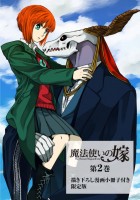If you’ve been a long-time MangaBlog reader, you may have noticed that posts have been a little sporadic lately. Brigid and I have teamed up to ensure that the blog is updated on a more regular basis. Over the coming weeks, we’ll be introducing a few new features. For those of you who read MangaBlog for Brigid’s impeccable news round-ups, fear not—those will continue to be our bread-and-butter. And for those of you who remember The Manga Hall of Shame with fondness, we’ll be flexing our reviewing muscles as well. Stay tuned!
On to the links…
Remember NETCOMICS? Back in 2006, NETCOMICS broke new ground by offering readers an inexpensive way to read manhwa and manga online. Print editions of its most popular series soon followed, though by 2009 NETCOMICS appeared to be a digital-only operation again. In 2013, NETCOMICS dipped its toes back into the print waters with a handful of BL titles. This month, the publisher will release Give to the Heart, a series about a handsome water god and his would-be human bride. (Hat tip to Lori Henderson.)
The folks at Vertical, Inc. address fan concerns about manga pricing with a refreshingly candid response.
Once again Attack on Titan dominates the New York Times’ Manga Bestseller list. You might be surprised to learn, however, that it’s the first volume of Titan that tops this week’s list, not the most recent—an impressive feat, considering that volume one was released in June 2012! Other titles making a strong showing include the latest installments of One Piece—now up to volume 72 in English—and Soul Eater.
Seven Seas continues to unveil new licenses for 2015. Among the most promising are Nami Sano’s Haven’t You Heard? I’m Sakamoto, which documents the exploits of an impossibly cool teenager, and Kori Yamazaki’s The Ancient Magus’ Bride, which explores the relationship between a wizard and an orphan girl.
Erica Friedman posts her weekly round-up of yuri manga news.
Over at Heart of Manga, Laura makes an impassioned licensing plea for Ao Haru no Ride, a shojo series by Strobe Edge manga-ka Io Sakisaka. She also offers a brief run-down of all the series currently running in Bessatsu Friend magazine.
Headed to New York Comic Con this week? The New York Times revisits the first New York comics convention, which was held in 1964. Fun fact: Fantasy author George R.R. Martin—yes, that George R.R. Martin—attended.
Reviews: Shaenon Garrity jumps in the WABAC machine with a nostalgic look at Rumiko Takahashi’s short story anthologies Rumic Theater and One or Double. If you haven’t read them, her post may send you scurrying to eBay to scare up copies. Other reviews of note:
Allen Kesinger on vol. 1 of Doubt (No Flying No Tights)
Allen Kesinger on vol. 2 of Doubt (No Flying No Tights)
Marissa Lieberman on vol. 1 of Dragon Ball Full Color: Saiyan Arc (No Flying No Tights)
Sean Gaffney on vol. 1 of Durarara!! Yellow Scarves Arc (A Case Suitable for Treatment)
John Rose on vol. 34 of Fairy Tale (The Fandom Post)
Leroy Douresseaux on vol. 2 of Food Wars! (Comic Book Bin)
Kate O’Neil on vol. 3 of Gangsta (The Fandom Post)
Rebecca Silverman on vol. 1 of Honey Blood (Anime News Network)
Rebecca Silverman on The Man of Tango (Anime News Network)
Lori Henderson on vol. 1 of Moonlight Kreuz (Manga Xanadu)
Danica Davidson on vol. 1 of Noragami: Stray God for Hire (Otaku USA)
Jessica Chautin on Sakuran (No Flying No Tights)















 U Don’t Know Me | By Rakun | Published by NETCOMICS – “I realized that the reason the two of us couldn’t stand forever in the same place wasn’t just because I couldn’t keep up with his height–a height, by the way, which began outgrowing my own little by little.” – Prologue, U Don’t Know Me
U Don’t Know Me | By Rakun | Published by NETCOMICS – “I realized that the reason the two of us couldn’t stand forever in the same place wasn’t just because I couldn’t keep up with his height–a height, by the way, which began outgrowing my own little by little.” – Prologue, U Don’t Know Me

 10. DEJA-VU: SPRING, SUMMER, FALL, WINTER
10. DEJA-VU: SPRING, SUMMER, FALL, WINTER 9. NARRATION OF LOVE AT 17
9. NARRATION OF LOVE AT 17 8. PRIEST
8. PRIEST 7. RUN, BONG-GU, RUN!
7. RUN, BONG-GU, RUN! 6. 10, 20, AND 30
6. 10, 20, AND 30 5. GOONG: THE ROYAL PALACE
5. GOONG: THE ROYAL PALACE 4. FOREST OF GRAY CITY
4. FOREST OF GRAY CITY 3. SHAMAN WARRIOR
3. SHAMAN WARRIOR 2. DOKEBI BRIDE
2. DOKEBI BRIDE 1. BUJA’S DIARY
1. BUJA’S DIARY